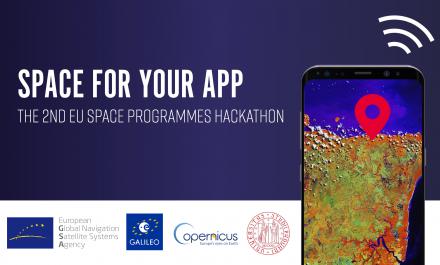Experts and developers interested in shaping the future of Earth Observation (EO), location-based services (LBS) and the Internet of Things (IoT) will be heading to Padua, Italy on 24-26 October 2018, to take part in the 2nd EU Space Programmes Hackathon. Don’t miss out on this opportunity to showcase your skills, gain a competitive advantage for your future projects and win great prizes.

At the Hackathon, experts from various fields, such as engineers, geologists, economists, and sociologists, will join with app developers, coders, graphic and web designers, data scientists, marketers, dreamers, and pioneers who want to shape the future of EO, LBS and IoT, to discover how space technologies can help transform their ideas into reality.
The assembled hackers will focus in particular on applications in the areas of smart mobility, augmented reality, geo-marketing, and mapping and GIS. Other target areas will include fitness, sport and mHealth, business applications and social networking. Participation by multidisciplinary teams from diverse and complimentary backgrounds will ensure a holistic approach to app development.
Galileo and Copernicus
The participants will have access to an API provided by the European Space Agency (ESA) that will allow easy access to Earth Observation data, in particular from the Copernicus programme. They will also have Galileo enabled hardware with GNSS raw measurements to play with. What’s more, they will be able to refer to a “White Paper on using GNSS Raw Measurements”, produced by the European GNSS Agency (GSA), for information on how to leverage raw measurements to implement advanced GNSS techniques in mass-market devices.
As users and app developers can now access GNSS raw measurements on Android 7+, Galileo’s high accuracy in timing and positioning is opening the door to a new range of applications - from drones and car navigation to search and rescue, law enforcement, and so on. Copernicus imagery and data can also be used for a wide array of applications such as sustainable development and nature protection, regional and local planning, agriculture and forestry, public health and civil protection.
Prizes and other opportunities
A board composed of senior officials from GSA, ESA, Unismart and the University of Padua will evaluate all the projects and select a prize-winner. The GSA will make it possible for the winning team to present their application at European Space Week in Marseille, on 3-6 December 2018, which will be a great opportunity to take the winning application idea further. ESA will offer the winning team the opportunity to participate in the ESA-ESRIN app camp in 2019.
Attendance at the hackathon is free of charge. For more information and to register, click here.
Media note: This feature can be republished without charge provided the European GNSS Agency (GSA) is acknowledged as the source at the top or the bottom of the story. You must request permission before you use any of the photographs on the site. If you republish, we would be grateful if you could link back to the GSA website (http://www.gsa.europa.eu).